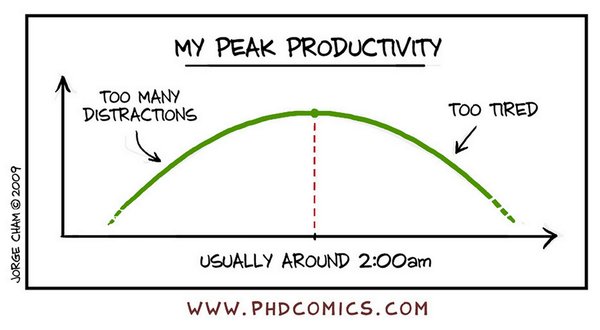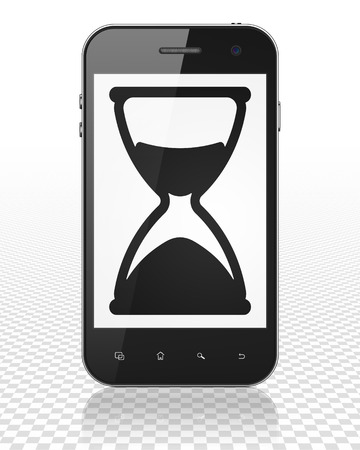I like getting up early and arriving early. But I find the hours late at night can unlock a lot of creativity so I often get up late unless I schedule something early. I also like working up to the last possible moment–what is it about the last few minutes before you have to leave that are so productive–that I arrive late. Starting from myself as someone with good intentions but poor follow through here are some observations and suggestions for getting up early and arriving early.
Getting Up Early
“January 29, 1866. (Nine o’clock in the morning).—The gray curtain of mist has spread itself again over the town; everything is dark and dull. The bells are ringing in the distance for some festival; with this exception everything is calm and silent. Except for the crackling of the fire, no noise disturbs my solitude in this modest home, the shelter of my thoughts and of my work, where the man of middle age carries on the life of his student-youth without the zest of youth, and the sedentary professor repeats day by day the habits which he formed as a traveler.”
Henri Frederic Amiel in his Journal
 Getting up early can be a habit, a source of competitive advantage, or a necessity. Here are some tips for getting up early that will be most useful for entrepreneurs who have not cultivated it as a habit.
Getting up early can be a habit, a source of competitive advantage, or a necessity. Here are some tips for getting up early that will be most useful for entrepreneurs who have not cultivated it as a habit.
- Have a real reason for getting up early: unless you like getting up early, which I do many days but not all, and it does not give you a business advantage, then adjust your schedule to fit your natural circadian rhythm. If you are working across time zones then you may need to get up early to time shift more of your day to work with customers, prospects, partners, coworkers, etc..
- Prepare the night before: if you know mornings are not your thing then get as much as possible ready the night before. For example, take a shower unless a shower really helps you wake up. Get your backpack, attache case, utility belt or “go bag” packed while your mind is clear. Prepare a list of exactly what you need to do to be ready to leave the house or get on the phone that cannot be done the night before.
- Consider meditation: The morning after a full sleep it acts as a turbocharger that enables me to act with much more clarity for several hours and the morning after not enough sleep I find 20 minutes of meditation is worth about 3-4 hours of sleep (or at least postpones the need until mid-afternoon). Always set an alarm so that if you fall back asleep you don’t miss your commitment.
- Set an timer on your phone early in the evening the night before: in my experience I stay up too late ten or fifteen minutes at a time–just one more thing and then I will turn in. I fight this two ways: an audio clock that announces every hour so that even if I am absorbed in something I am reminded what time it is. I also set my phone timer for when I need to wake up so that it keeps a running countdown of how much sleep I will get if I stop right now.
- Schedule priority tasks for early in the day and let go the somewhat important: I try to schedule key tasks for early in the day so that they get done. I also try to let go of the somewhat important or schedule or a later day in the week or month so that I have fewer excuses for not going to sleep.
- Be careful what you eat for breakfast: avoid heavy carbohydrate or sugars or you can trigger a sluggishness that is hard to dispel.
Arriving Early


- Start the week before or at least the day before: if you arrive early but are unprepared the effect is the same–or perhaps even worse–as a late arrival. Have an agenda for a meeting, a list of key points or questions for a conversation, and if it’s an event review who will be speaking or attending and make a list of who you want to talk to.
- Make a realistic estimate for how long it will take to arrive: and determine what your departure time should be. This means when you are backing out of the driveway in your car not starting to pack up, this is which train you will catch, or when you will dial the phone number to start or join a call.
- “It’s OK if you cannot be on time, just be early.” Frank Bailey related this as advice he got from one of his managers. I try to follow it.
- Bring work you can do if the meeting starts late: one of my fears is lost or unproductive time. I think this is what sometimes drives me to finish that one last email–after rereading and revising a few times–that makes me ten minutes late. I try to carry a book I can read or a small task or two I can do while I am waiting so that I reframe arriving early as a chance to get one more thing done while I wait, or two if the meeting starts late.
- Set a timer for when you need to leave: same trick as getting up early, this works for the one or two critical meetings in a day by saving you the mental recalculation of how much time you have left before you must leave or dial.
- If you have a prior call or meeting be clear how much time you have at the start: be very clear up front how much time you have. Don’t open new items in the last ten to fifteen minutes of the prior call if they are going to be complex or contentious, schedule a follow on conversation where you can send material in advance. If new issues arise that will push you over the deadline then schedule another call/meeting to address them.
- Don’t book “back to back” meetings: there are a couple of reasons to avoid this if you can. I take notes as I go in most meetings and find that I can summarize them in 15-30 minutes (depending upon how long the prior meeting was and how many topics were covered in what detail). Doing that right after the meeting and getting my notes, suggestions, and observations out means that more positive action is likely to flow from the conversation. So I try and block at least 30 minutes after a meeting to get the notes out. You also may need to factor in travel time between meetings.
A Quarter of an Hour Early
Horatio Nelson: “I have always been a quarter of an hour before my time and it has made a man of me.”
“When he was on the eve of departure for one of his great expeditions the coachmaker said to him, “The carriage shall be at the door punctually at six o clock”; “A quarter before,” said Nelson. “I have always been a quarter of an hour before my time and it has made a man of me.”
Letter from Sir Thomas Buxton to his son quoted in “Life of Sir Thomas Fowell Buxton” from Sylvanus Urban (ed.) The Gentleman’s Magazine” July to December 1848, p. 577
If you have other tips please leave them in the comments.
Related Blog Posts
- Cecily Drucker’s Startup Secrets
- Late Night Comments and E-Mail
- By Sunday Night Your Chips Are Down For The Week
- Productive Larks and Creative Owls
Image Credits
- “Peak Productivity” PhD Comics
- “HourGlass” Max Babakov

Pingback: SKMurphy, Inc. Quotes For Entrepreneurs April 2016 - SKMurphy, Inc.